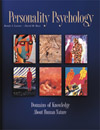
Cognitive topics in personality |  |
Chapter OutlineCognitive Topics in Personality
Introduction
- Cognitive approaches to personality focus on differences in how people process information
- Cognition refers to awareness and thinking as well as to specific mental acts such as perceiving, interpreting, remembering, believing, anticipating
- Three levels of cognition of interest to personality psychologists
- Perception: Process of imposing order on information received by our sense organs
- Interpretation: Process of making sense of, or explaining, events in the world
- Beliefs and desires: Standards and goals people develop for evaluating themselves and others
- Fourth cognitive domain of interest: Intelligence
Personality Revealed Through Perception
Field Dependence-Independence
- Field independent (relative to field dependent) people have the ability to focus on details despite the clutter of background information
- Measures used to assess field-dependence
- Rod and Frame Test (RFT)
- Embedded Figures Test (EFT)
- Field dependence-independence and life choices
- Education: Field independent people favor natural sciences, math, engineering, whereas field dependent people favor social sciences and education
- Interpersonal relations: Field independent people are more interpersonally detached, whereas field dependent people are attentive to social cues, oriented toward other people
- Current research on field dependence-independence
- Field independent people are better able to screen out distracting information and focus on a task
- Field-independent students learn more effectively than field dependent students in hypermedia-based instructional environment
Pain Tolerance and Sensation Reducing-Augmenting
- Aneseth Petries reducer-augmenter theory of pain tolerance
- People with low pain tolerance have a nervous system that is amplified or augmented subjective impact of sensory input
- People with high pain tolerance have a nervous system that is dampened or reduced effects of sensory information
- Reducers seek strong stimulation, perhaps in order to compensate for lower sensory reactivity
- Reducers may use substances (nicotine, caffeine, alcohol, other drugs) to artificially "lift" their arousal level
Personality Revealed Through Interpretation
Locus of Control
- Locus of control describes persons interpretation of responsibility for events
- External locus of control: Generalized expectancies that events are outside of ones control
- Internal locus of control: Generalized expectancies that reinforcing events are under ones control, and that one is responsible for major life outcomes
- Rotters "expectancy model" of learning behavior
- Learning depends on the degree to which a person values a reinforcer—its reinforcement value
- People differ in their expectations for reinforcement—some believe they are in control of outcomes, whereas others do not
Learned Helplessness
- Animals (including humans) when subjected to unpleasant and inescapable circumstances, become passive and accepting of a situation, in effect learning to be helpless
A Closer Look: Reformulated Learned Helplessness; Explanatory Style
- Explanatory style: Tendency that some people have to use certain attributional categories when explaining causes of events
- Three broad categories of attributions
- External or internal
- Stable or unstable
- Global or specific
- Pessimistic explanatory style
- Emphasizes internal, stable, and global causes for negative events
- Associated with feelings of helplessness and poor adjustment
- Explanatory style is stable over time
Personality Revealed Through Beliefs and Desires
- One key dimension of beliefs and desires are personal goals for the future
- People differ in these beliefs and desires, and these differences reveal and are part of personality
- Different names and approaches for these beliefs and desires: Personal strivings, current concerns, personal projects, life tasks
Personal Projects Analysis (Little)
- Personal project: Set of relevant actions intended to achieve a goal a person has selected
- Personal Projects Analysis was developed to assess personal projects
- What people believe about their projects (how important they are, how stressful, how much success they are having in achieving their goals) is useful for understanding how personality works in everyday life
- Personality can be manifested in everyday projects people have
Life Tasks, Goals, and Strategies (Cantor)
- Emphasizes the "doing" of personality over the trait approachs "having" of personality
- Emphasizes active nature of personality
- Personality is what structures a persons daily life through the selection of goals and desires, that then determine specific strategies that people use
- Life tasks: Personal versions of culturally mandated problem solving goals; problems that people work on in day-to-day lives
- Strategies: Characteristic ways people respond to challenges of making progress on a particular life task
- Three strategies have been studied extensively
- Social constraint: Taking the lead from other people in social situations
- Defensive pessimism: Preparing for failure ahead of time; set low expectations for own performance and focus on worst-case outcomes
- Outcome focus: Reassurance-seeking in particular life task domain
Intelligence
- Achievement versus aptitude views of intelligence
- "g" or general intelligence versus domain-specific intelligences
- Widely accepted definition of intelligence (Gardner, 1983): Application of cognitive skill and knowledge to solve problems, learn, and achieve goals valued by the individual and the culture
- Gardners theory of multiple intelligences
- Emotional intelligence (Goleman)
- Traditional measures of intelligence predict school performance, but not outcomes later in life, such as occupational attainment, salary, marital quality
- Emotion intelligence strongly predicts these life outcomes
- Emotional intelligence includes a set of five specific abilities
- Awareness of our own feelings and bodily signals, being able to identify our own emotions, and make distinctions
- Ability to regulate emotions, especially negative emotions, and to manage stress
- Ability to control ones impulses, direct attention and effort, delay gratification, and stay on task toward goals
- Ability to decode social and emotional cues of others, empathy
- Ability to influence and guide others without incurring anger, resentment
|
|
|